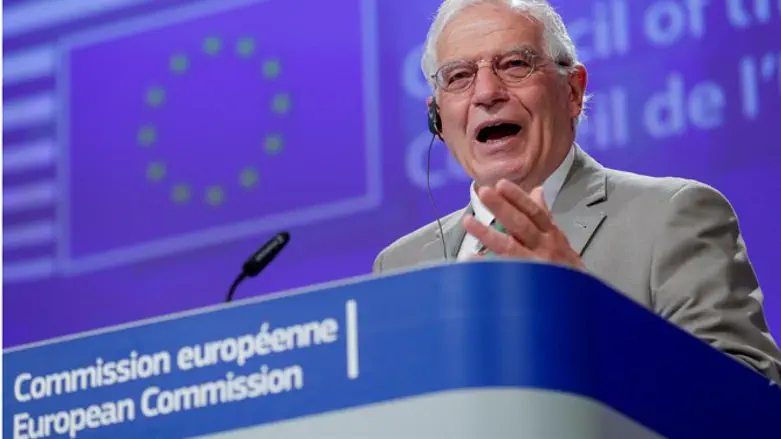
The European Union's High Representative for Foreign Affairs, Josep Borrell, said on Tuesday that Israel's plans to apply sovereignty over Judea and Samaria will be "the most important item on the agenda" of the upcoming meeting of the EU Foreign Affairs Council on Friday, Haaretz reports.
When asked about sanctions, Borell said he will consider the different positions that may arise within the union.
"We are by the time being far away from discussing about sanctioning - but it’s important to know which is the position of the member states,” he was quoted as having said at a press conference in Brussels.
“Everything in [EU] foreign policy requires unanimity, especially sanctions, and we are by the time being far away from discussing about sanctioning,” added Borell, stressing that the matter is “a very divisive issue inside the [Foreign Affairs] Council and different member states have different positions, we noticed it when we discussed [annexations] months ago."
Borell added that he intends to talk to the new Israeli Foreign Minister, expected to be MK Gabi Ashkenazi of Blue and White, once appointed, and will congratulate the new Israeli government once sworn in.
The coalition agreement between Prime Minister Binyamin Netanyahu and Blue and White chairman Benny Gantz states that the government could apply sovereignty to parts of Judea and Samaria this coming July.
Borrell recently warned Israel against applying sovereignty over portions of Judea and Samaria.
“The European Union reiterates that any annexation would constitute a serious violation of international law. The European Union will continue to closely monitor the situation and its broader implications, and will act accordingly,” he said.
Palestinian Authority (PA) cabinet leader Mohammad Shtayyeh said Tuesday in a tweet that he discussed with Borell the "urgency of a united European position to break the fait accompli that Israel seeks to impose, defend the rights of the Palestinian people, protect [international] law and European values, and to restore hope in the [international] justice system."
Haaretz reported on Tuesday that the foreign ministers of countries in the EU on Friday will debate possible responses to moves by Israel to apply sovereignty over Judea and Samaria, should this clause in the Likud-Blue and White coalition agreement be implemented.
Borrell is inclined to wait and see how the new Israeli government will act, several member countries have been exerting pressure to approve sanctions in advance as an act of deterrence, according to Haaretz. These could include denying Israel membership in trade agreements, special grants or cooperative ventures in various fields.
Sources familiar with the discussions told the newspaper that there is increasing support among EU states for sanctions intended to deter Israel from annexing any territory. France, Spain, Ireland, Sweden, Belgium and Luxembourg are all said to be calling for a tough line on the issue.
The sources added that some steps, like trade agreements, do not require the unanimous agreement of all the member states; as a result, Israel won’t be able to count on the veto of friendly EU countries like Hungary or the Czech Republic.
Moreover, member states can decide on their own independent protest moves against Israel, they said.
The United States appears to be backing the Israeli sovereignty move, as US Secretary of State Mike Pompeo indicated recently that application of sovereignty was ultimately "an Israeli decision."
A State Department spokesperson later said that “we are prepared to recognize Israeli actions to extend Israeli sovereignty and the application of Israeli law to areas of the West Bank that the vision foresees as being part of the State of Israel.”
The spokesperson also added that the US would ask Israel’s new unity government to negotiate with Palestinian Arabs.
Pompeo, who will visit Israel on Wednesday, told the Israel Hayom newspaper in an interview that the decision to apply sovereignty is Israel’s to make.
“I’ve said in the past that this is Israel’s decision to make. I want to understand what the new government thinks about that,” he said.
